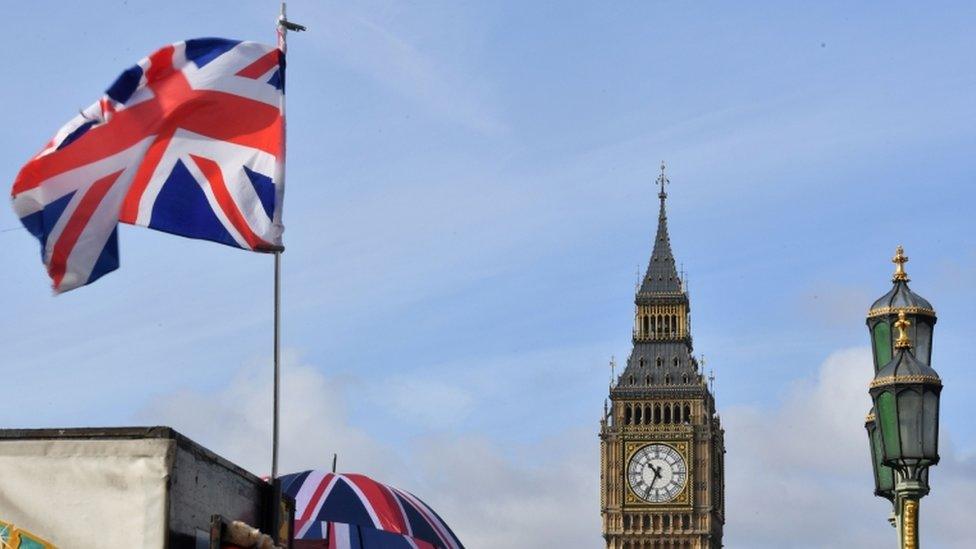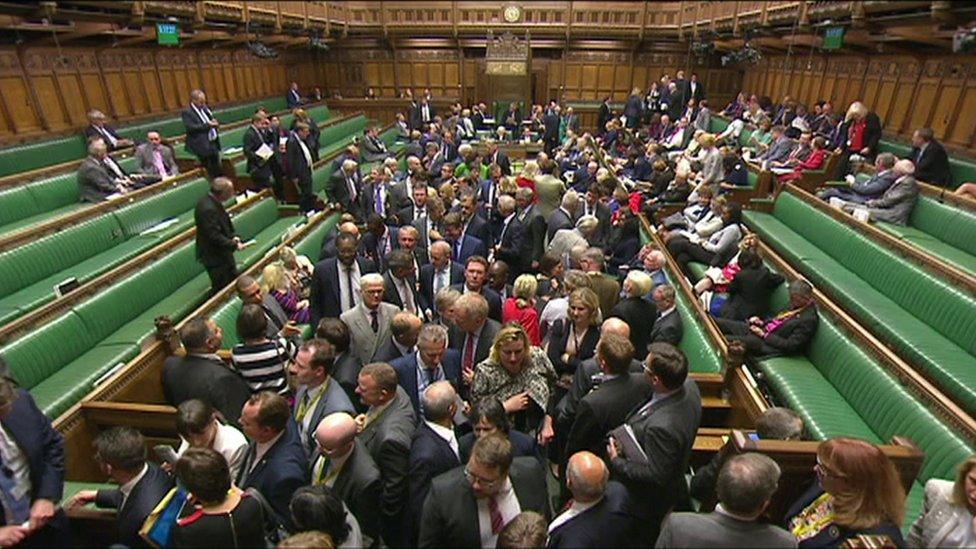EU bill debate could strain tempers
- Published
- comments

It may not be a murder weapon, but at the very least it will be an instrument of torture for the government - the forthcoming debates on the EU Withdrawal Bill, external will put massive strain on ministers, the Tory whips and on Conservative unity.
The bill will provide the legal toolkit necessary to implement Brexit, enacting whatever withdrawal deal is reached, and providing a mechanism for the huge number of consequential legal changes which will flow from it.
The opposition parties will seek to amend the bill in the Commons and the Lords both on process issues, to limit the sweeping powers the government wants; and on substance, to try and bend the bill towards their visions of what Brexit should look like.
Perhaps a few decades from now, some great playwright of the age will dramatize the ensuing legislative duel, in a production to rank with James Graham's This House, external. But it may be a while before we know whether it will be comedy or tragedy, or a whodunit.
The key to the process will be the programme motion, which would set a timetable for the discussions.
As I write, this has not been published, and behind the scenes the government and Opposition business managers are doubtless haggling over the number of days of committee of the whole House proceedings the bill will face.
Unusually, there will be a two-day second reading debate, starting on Thursday and concluding on Monday 11 September - there are two motions from the SNP and Plaid Cymru to block the bill then and there (and I'm told a similar Lib Dem production is in the pipeline) but they seem unlikely to succeed.
Will Tories risk the whips' wrath?
And at that point, the programme motion will be voted on as well. It could provide the first big test of the government's majority, or to put it another way, the first test of whether anti-Brexit Tories will risk the wrath of their whips.
At a guess, the programme motion will set out plans for a couple of days of committee stage debate every week from the end of the conference recess, right up to Christmas, and possibly beyond.
Each day will deal with a particular section of the bill, and will end with votes on amendments.
There will only be a report stage if changes are actually made - these might be hostile amendments pushed through by the Opposition, or drafting tweaks that the government decides to add, but either way, a report stage debate would then be required.
Why does this timetabling matter? In the Coalition years, Nick Clegg's Lords Reform Bill won a stonking majority at second reading in the Commons, but was then effectively defeated by Labour's refusal, backed by a large contingent of Tory rebels, to agree to a programme motion.

Endless votes could strain MPs' patience
Faced with the prospect of an open-ended committee stage rambling inconclusively on, for months, and crowding out other legislation, the bill was dropped.
But for the EU Withdrawal Bill, that option does not exist - it is essential to the process of Brexit - so the government would have to press ahead with it, even if it could not get a programme motion agreed.
In theory, it has a slim but functional majority, with the support of the DUP - but that could be vulnerable on a technical parliamentary issue like this, not least because there are pro-Brexit as well as anti-Brexit Conservative MPs who are queasy about the extent of the powers the bill gives the government.
So life would be much easier if Labour would do a deal on the programme. This gives Labour's Chief Whip, Nick Brown, leverage to press for a substantial number of committee stage days, somewhere north of 20; or he might just refuse to deal, saying Parliament should not be restricted by an arbitrary time limit on such a gigantic issue.
And in that case, the government might retaliate by allowing debate to run on late into the night.
Once committee stage is reached, timetabled or otherwise, expect a deluge of amendments from all sides, on all kinds of issues.
The way these are packaged together - "grouped" - by the Speaker will be critical, and there will be quite an art to selecting the amendments with the biggest head of steam behind them.
And the Chair will also have to manage an increasingly tetchy House, seething after weeks of late nights, endless votes and legislative attrition. It will be tough on the Chair too….one of the more glorious survivals from the early-1990s Maastricht debates, external in the Today in Parliament archives is the moment, in the small hours of the morning when Bill Cash rose to make his umpteenth point of order, and Mr Speaker Weatherill, goaded beyond endurance, was caught employing a most un-Speaker-like expletive.
But the key question remains whether there are enough Conservative MPs out there, who are prepared to vote against their government.
It would not take many to overturn the slim majority provided by the DUP - but then you have to factor in the possibility of pro-Brexit Labour MPs defying their whip, not to mention the possibility of absences caused by illness or even late trains and traffic jams.
All being equal, a government defeat would probably require ten-plus Conservatives to go off piste, and I am not sure there are that many who would. Remember, whatever their feelings about Brexit, they would be taking an action that rocked, potentially toppled, their government and even put Jeremy Corbyn into Downing Street.
They might be prepared to accept the career consequences (being cast into the outer darkness), but not the prospect of a Tory civil war and a Left Labour government.
What about the Lords?
Of course, the bill is not out of danger once it has cleared the Commons.
In fact, its Lords consideration is probably the moment of maximum risk - there is no government majority in the Lords and the bill deals with issues like scrutiny of secondary legislation and powers to create public bodies that tend to get their lordships' juices flowing.
If peers throw the bill back to the Commons, loaded with amendments on those issues, perhaps that will provide an even sterner test of wavering Tory MPs and the mettle of their whips as well.
Perhaps all this is one reason why the prime minister has brought the respected former whip Sir John Randall into her Downing Street operation, external.
The birdwatching former MP is supposed to be advising her on environmental issues - but is he really backseat-driving the management of this bill?